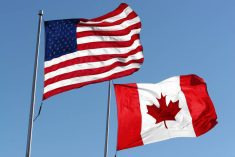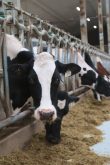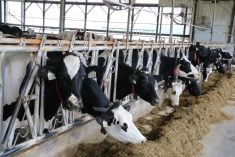BRUSSELS — Europe’s dairy processors dream of more product on Canadian grocery shelves after Canada-European Union free trade talks, but an industry leader says Canadian fears of the impact are exaggerated.
“Canada should not be panicked because you think our free trade agreement will mean we export more tonnes and tonnes and tonnes,” said Bénédicte Mosure, director general of trade and economic policies for the European Dairy Association.
“The opportunities we have will depend on the products we have, the price at that time and other opportunities. If we have a better market closer, why would we go to Canada? It will depend on many things and we could never make an estimate.”
Read Also

Farming Smarter receives financial boost from Alberta government for potato research
Farming Smarter near Lethbridge got a boost to its research equipment, thanks to the Alberta government’s increase in funding for research associations.
However, increased European access to Canada would also come with the proviso that the EU will continue to be able to use dairy export subsidies if needed to deal with low prices.
EDA secretary general Joop Kleibeuker said the EU has committed through the WTO to end export subsidies by 2013, but the export rebate scheme remains part of the EU arsenal without a WTO deal and a move by other countries on their commitments.
“There still is an export rebate scheme, and at the moment prices are at or near the (trigger) level, they can consider to start to use exports to take off pressure from the market,” he said.
“As long as that (a binding WTO deal) is not happening, the EU will not kick its export scheme out of its regulations, but it is handled with a lot of care. There has not been since 2007 much use made, only at the bottom of the crisis in 2008-09.”
Most Canadian dairy exports ended after an earlier WTO ruling said they were effectively subsidized because of higher domestic prices. The ruling put Canada over its allowed limit.
The European dairy processing industry, worth $200 billion Cdn or more in sales, exported 14,700 tonnes of product to Canada in 2010, mainly cheese.
Product entered the country through Canada’s tariff rate quota (TRQ), which allows imports at lower tariffs under WTO rules to fill a portion of the domestic market.
“It was all through the TRQ,” Mosure said. “Outside of it, the quota is 253 percent and that is an interesting disincentive.”
The EDA thinks there is a Canadian consumer craving for more product if European negotiators can convince Canada to offer preferential treatment to EU dairy in return for better meat or grain access.
“The important point for us is that, and it is perhaps arrogant, in Europe we know very well what type of dairy products we can produce,” Kleibeuker said.
“Different cheeses we export have had good acceptance in the U.S. We are sure we can also export significantly more to Canada as well. It would give Canadian consumers a broader range of good products.”
Mosure said the European dairy sector has become more efficient and competitive in an increasingly liberalized trade system as the European dairy supply management system declined over the past decade, the quota system weakened on the way to elimination in 2015 and domestic support reduced. She said farmers have adjusted and support the system.
Canadian farmers will be hurt if they aren’t planning to adjust to a less-protected system, she added.
“To be honest, I feel sorry for them because the minute there is a deal, you will have overnight the need to be more competitive in their own market and in the external market,” she said. “The EU now has prepared for years. Support and protection has declined and yet we have seen we are less at risk from imports. If Canada does nothing for one or two more years, it could be a nightmare for them.”
















